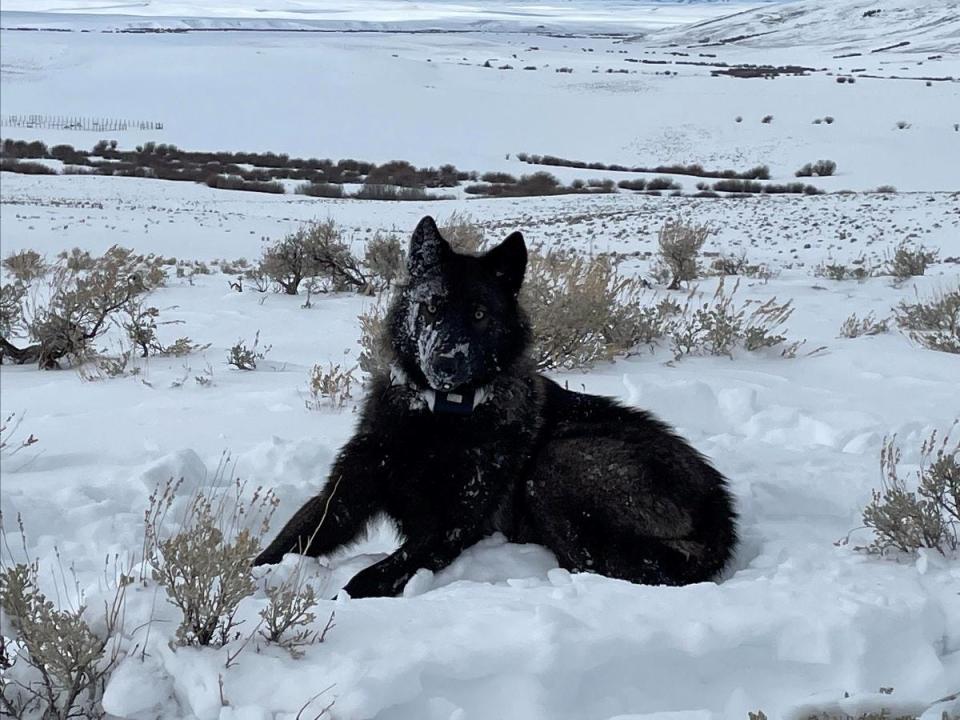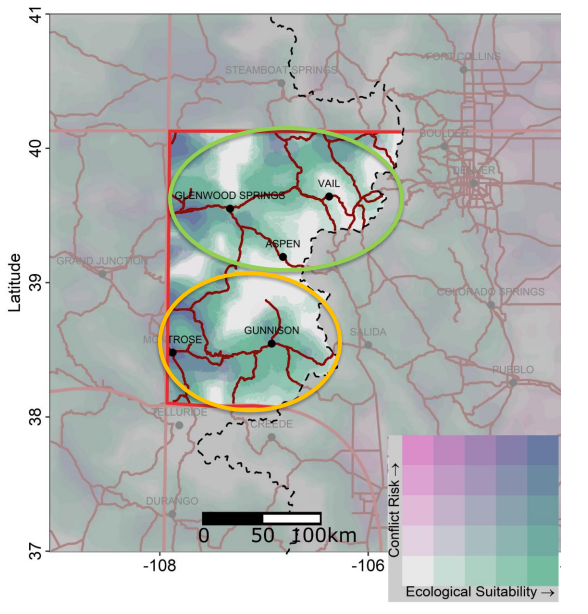Idaho's Nez Perce Tribe will 'likely' provide wolves to Colorado by the end of this year
- Oops!Something went wrong.Please try again later.
Colorado's persistent but teetering assurance that it will have reintroduced wolves on the ground ahead of the end of this year's deadline received a voice of validation Monday.
A Nez Perce Tribe spokesperson told the Coloradoan on Monday it will "likely" be able to provide source wolves to Colorado to help meet its deadline.
Aaron Miles, the Idaho tribe’s natural resource manager, said the tribe is willing to help and that conversations between Colorado Gov. Jared Polis, who strongly supports wolf reintroduction, and Shannon Wheeler, chairman of the tribe's executive committee, have taken place and continue to take place to work out the details.
Colorado hopes to release 10 to 15 wolves during its first year of reintroduction.
"Yes, we are working hard to develop that plan and the Nez Perce Tribe has every intention of helping Colorado be a source of wolves," he said. "Our executive committee has given us the go-ahead as a department to begin working on this. I think it is likely we could do it to meet their deadline."
It's a matter of logistics, Miles cautioned, if wolves can be captured and translocated to Colorado in time to meet the ballot initiative's mandated deadline.
Obstacles include finding experts to safely capture the wolves and whether the area receives enough snow to aid in helicopter capture of the wolves, he said. Nez Perce tribal land encompasses millions of acres in the heart of Idaho's wolf country, spilling over into Washington, Oregon and Montana.
Nez Perce's willingness to help comes as good news after Wyoming, Montana and Idaho governments told Colorado they won't serve as source states for the reintroduction. Washington is mulling over the possibility but said it can't provide wolves for Colorado this year. Oregon is still contemplating if it will provide wolves to Colorado.
That prompted Colorado to turn to the Nez Perce Tribe. Miles said conversations between Colorado and the tribe began about a month ago.
The unexpected uncertainty of whether Colorado will be able to find wolves in time to meet its deadline has put increasing pressure on the state.
The situation became so dire that Colorado Parks and Wildlife Director Jeff Davis cautioned Colorado Parks and Wildlife Commission members at its Aug. 25 meeting to not put undue pressure on the Washington wildlife commission to vote to provide wolves to Colorado.
"Let’s talk before we just barrage Washington’s commission," Davis told the commission. "I say that because (Washington Department of Fish and Wildlife Director Kelly) Susewind is navigating the complicated situation and it's super sensitive, so if too many people are barraging folks or lobbying folks, you’re likely going to do more harm to our likelihood than have success."
Does the Nez Perce Tribe have the authority to capture wolves and give them to Colorado?
The tribe does not need the blessing or backing of the Idaho state government to capture and translocate wolves because the tribe is a sovereign nation, which basically allows for self-government. Miles said that was secured in an 1855 treaty with the federal government.
The tribe was instrumental in reintroducing wolves to Idaho in 1995. The state of Idaho balked at helping with the federal government's Northern Rocky Mountains wolf reintroduction, which also included Yellowstone National Park, so the tribe stepped in and led the effort.
Miles said many of the tribe's wolf experts have retired, making it more difficult to help Colorado with source wolves.
"We largely no longer have the technical capacity of those people involved with the (1995) reintroduction, so we have our work cut out for us," he said. "It's now figuring out the details because you just can't get anyone to capture wolves; you have to have the right people and do it right. But if you have the energy on both sides to make it work, like we and Colorado do, you make it work."
Miles said wolves are revered in the tribe and, as such, it wishes to see proliferation of the animals.
"Our goal is different than someone else's goal," he said. "We have lots of legends based on animals that teach us how we fit into the natural world as people."

Why snow on the ground is critical for the capture of wolves
Colorado Parks and Wildlife's wolf recovery plan cited helicopter capture of wolves as the preferred method, as it is generally agreed by experts as the quickest and safest option as opposed to using traps and snares.
In wolf captures, generally, a plane is used to spot the wolves. Then a nearby helicopter flies to the site and hovers over the wolf, which is shot with a tranquilizer dart. Colorado's plan calls for the wolves then to be immediately transported, likely by air, to their release site(s) in Colorado. The cages will be opened, and the wolves are then on their own.
Reid DeWalt, the state wildlife agency's assistant director, told the Colorado Wildlife Commission at its Aug. 25 meeting that the agency sees the wolf release season as mid-December until the middle of March.
"We really need that snow for helicopter capture," he said. "Wolves are fast and you're not going to really track them down with a helicopter (without snow), and we want to capture them quickly. But if it doesn’t snow, we will have to capture them in a different way."
Colorado Parks and Wildlife captured and collared a male wolf that naturally migrated into the state and one of its pups in February 2021 and 2022, respectively.
DeWalt told the commission it has 20 collars ready to place on the reintroduced wolves.
"December is coming quick and we have a lot to do," DeWalt told the commission. "But we expect to meet the deadline.''
Where Colorado plans to release reintroduced wolves
DeWalt told the commission a team is actively looking at around 10 potential release sites west of the Continental Divide in case weather eliminates some of the sites. It's likely releases will take place at two to three sites, according to the state's recovery plan.
The state's wolf recovery plan has identified the initial releases will take place on state and private land in an oval shape roughly with Glenwood Springs on the west, Kremmling on the north, Vail on the east and Aspen on the south. The area includes Interstate 70 running through the middle.

This article originally appeared on Fort Collins Coloradoan: Nez Perce Tribe will 'likely' give wolves for Colorado reintroduction

